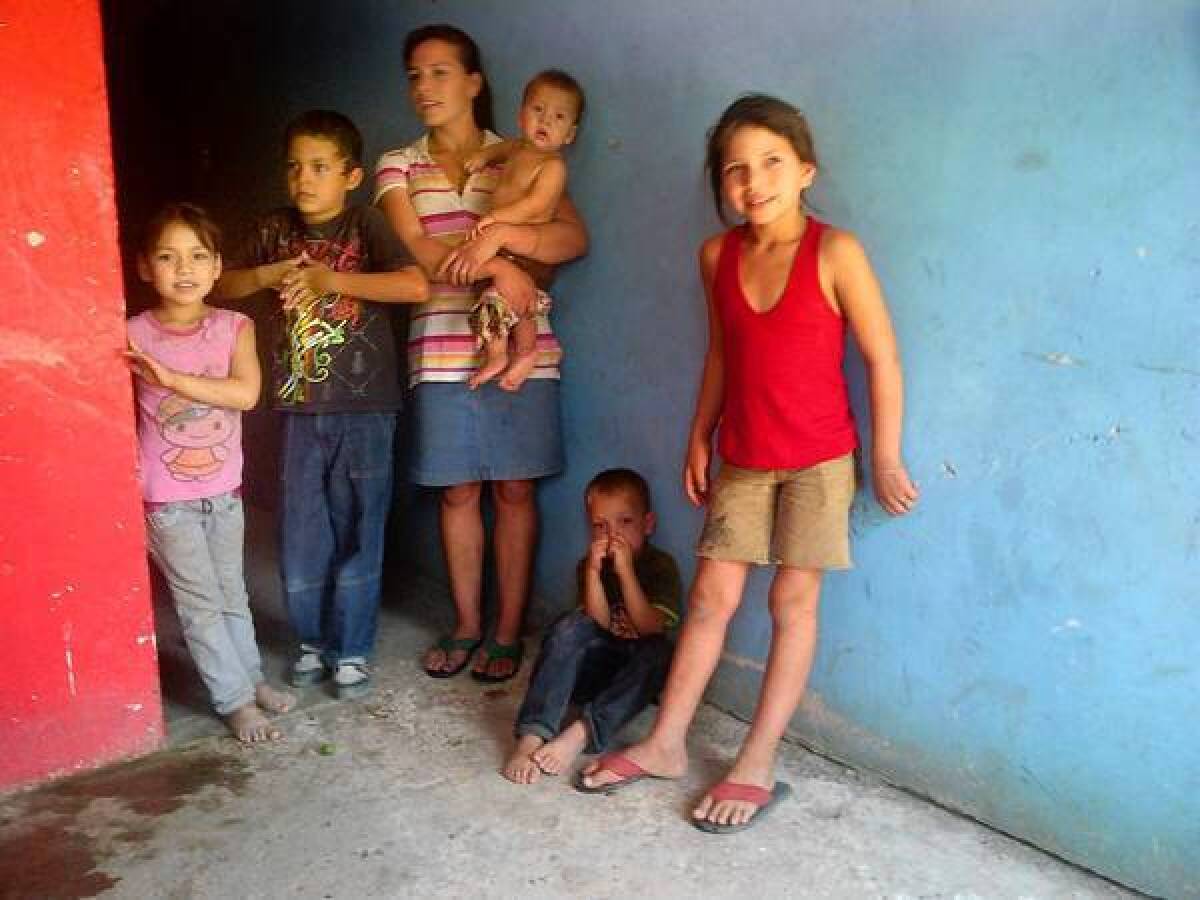Mexico drug war displaces families in Sinaloa highlands

- Share via
CULIACAN, Mexico — For generations, the extended Hernandez family tended fields of marijuana high in Sinaloa’s western Sierra Madre highlands.
They sold their crops to representatives of the Sinaloa cartel for a fraction of what the drug would bring at the U.S. border and eked out a pittance.
Barefoot children never went to school; they just helped their dads with the planting and harvest. Women washed clothes in the river. They burned pine sap for light at night because there was no electricity.
But a couple of weeks ago, the fighting that has raged as the Zeta paramilitary force tries to encroach on the Sinaloa cartel’s turf reached the string of ranchitos where the Hernandezes and scores of other families farmed.
In a single day, the new bad guys in town killed five members of the Hernandez clan. A couple of days later, five more.
“We knew we had to run,” said one of the women, Consuelo. “We barely had time to bury the dead.”
The Hernandez clan of four adults and 15 children ages eight months to 17 years piled into a pickup truck and drove for days to hide here in Culiacan, the state capital. As they fled, they grabbed four frying pans and a branding iron and left behind crops, cows and chickens.
All are crowded now into a windowless and abandoned two-room concrete house on the southern edge of the city.
They are among at least 1,500 families, some with 10 or 15 members each, who have been displaced in the last month by fighting in the pot- and poppy-growing Sinaloa hinterlands alone.
Nationwide, according to a recent study, drug war violence drove at least 160,000 Mexicans from their homes in 2011, a displaced population that the government largely refuses to acknowledge.
The study by the Norwegian Refugee Council, which has observed conflicts all over the world, was released in April. It says Mexico in 2011 saw a 33% increase from 2010 in the number of “internally displaced” people.
The government of President Felipe Calderon has been slow to recognize the problem and adopt internationally recognized ways to deal with it, United Nations officials say.
Reluctantly, the state government of Sinaloa began counting its displaced in May. Gov. Mario Lopez Valdez traveled to the battle zone between the Sinaloa cartel and the Zetas, today a string of veritable ghost towns. He announced he would deploy more troops to “restore security,” not exactly the cure sought by many of the hiding farmers. For them, more men with guns only seem to exacerbate the problem.
The governor reached the zone by helicopter; a group of reporters traveling to the event by land were intercepted and turned back by drug traffickers who control the roads with their own checkpoints.
In an interview, Sinaloa state prosecutor Marco Antonio Higuera sought to downplay the problem, saying people flee for many reasons. He also seemed to suggest that the displaced shared at least part of the blame for their plight because they coexisted and cooperated with traffickers for so many decades.
“The custom was not to denounce the presence of armed gangs,” Higuera said. “They never imagined the monster would turn on them.”
The entry of the Zetas to the drug-producing Sierra Madre highlands, part of a cataclysmic battle with the Sinaloa cartel to become the last gang standing, radically altered a long-sustained and tolerated way of life.
Consuelo and the rest of the Hernandezes have known nothing else. Families in the Sierra Madre worked together, intermarried, supported one another. There was no education or healthcare anywhere near. Only some of the older men can read and write. Children can’t do math but know how to separate the seeds from the marijuana plants to boost their value.
In the last days of April, the Hernandez family heard of newly arrived gunmen who were terrorizing their neighbors. Then, one afternoon last month, someone brought Consuelo the burned chunks of a human body — a not-so-subtle message.
It was hard to imagine that a drug war that has raged in other parts of Mexico was finally arriving at their ranchitos, Consuelo thought.
“People told us we could not live there anymore,” said the 35-year-old mother of seven, a compact woman with curly hair and short, thick arms who had her first baby at 14. “The evil people were taking over.”
When 10 relatives were killed in two days, the Hernandez family knew it was time to flee. The women gathered up clothes still wet from the river, a fistful of kitchen utensils and the children, and piled into a pickup truck.
It took three days of precarious travel through uncertain countryside to reach this capital, about 200 miles away.
Wrenched from their livelihood, they now pass listless days in the abandoned house, without beds or chairs or a future.
They have no way to earn a living, nor is there a system in place that might give them donated food, or put the kids in school.
“What will we do here?” Consuelo asked. “How will we live?”
More to Read
Sign up for Essential California
The most important California stories and recommendations in your inbox every morning.
You may occasionally receive promotional content from the Los Angeles Times.











